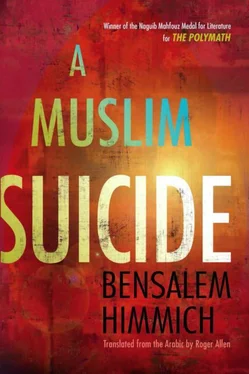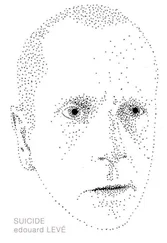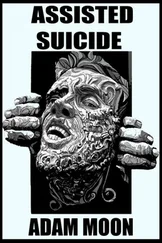There was a slight tapping on my door. I told whoever it was to come in, assuming that it would be the shaykh from Meknes, but it turned out to be the zawiya's warden. He greeted me as he entered and placed two baskets stuffed full of provisions alongside my bed. He told me that he had refused to allow the servant who had delivered them to give them to me in person, but had promised him that he would give them to me himself.
"Did he say anything else?" I asked in a croaking voice.
"I can't remember. He did suggest that you'd find some things in the baskets that would make you happy."
"Then what?"
"Nothing. Oh yes, a present came for Shaykh 'Abd al-Kamil from Meknes. I couldn't for the life of me understand him this morning. He refused to get out of bed and kept ranting and raving; I've never heard the like of it before. I gave him a physical examination, assuming that he was sick, but he seemed fine. On the other hand, you, Master, look very ill."
"Don't worry, dear friend. It's just a cold, nothing serious…"
He then told me that my fine reputation among the residents had led many of them to request to talk to me. The case of one of them, a sick old man, was urgent, in that he was spouting heresy, while another middle-aged resident was under observation because he was refusing to eat or drink anything and was contemplating suicide. I promised to visit both men after the afternoon prayer. Saying farewell, he left.
I pulled the two baskets close, anxious to find out what presents had been sent to me. There were a variety of costly foods that I took out, but in the very bottom there was a sealed letter. I opened it hurriedly and read what follows:
"From Fayha' of Sabta to the one who is beloved in everything:
"But for a cold I would have invited you back to see me at once. My great longing for you with all my heart is what is making me feel better, indeed invigorating and energizing me. Dear man of noble character and gleaming visage, I am praying for you and providing you with whatever I can in order that God may choose to preserve you for myself and for the things you love and cherish."
So this woman is to be my cure!
I took some of the bread she had sent, dipped it in honey, and ate it with relish. Then I tried some Indian dates, her delicious pot-pie with sugar and sauce, then some luscious, sweet-smelling fruit. I accompanied it all with thirstquenching draughts of juices and nonalcoholic wine. I felt more sated than I had ever done before. I gave thanks to God for restoring my appetite and at the same time giving me back my health and vigor.
With my cold now breathing its last, I got up and bounded my way over to the warden's place. His welcome was accompanied by astonishment.
"Here's my own horse," he told me, "the one that was stolen from you. He's made his own way back here, God be thanked! Get on behind me, and we can shorten the distance to the asylum where the two men I spoke to you about are being housed. We'll start with the one who wants to kill himself, and then visit the aged heretic."
I was delighted that the horse had been restored to its owner and praised God for bringing it to pass. I was then happy to accede to my colleague's request. The horse took us up hill and down dale over muddy terrain until we eventually reached a bare hilly spot; it was almost as though the trees had all been stripped bare or had been killed off in a fire. We dismounted and made our way toward a wide, low building. The doorman greeted us both profusely, and I followed the warden across a wide courtyard. It was populated by an odd assortment of humanity wearing strange clothing and behaving in unusual ways. Every one of them and every gesture they made indicated that they were all operating within spaces that were far removed from the normal dictates of reason, spaces where religion held no sway. I had encountered such people before and observed from close quarters as the powerful forces of delusion and self-destruction wreaked havoc on their facial expressions and features.
"Have all these people lost their minds?" I asked my companion in amazement.
"Yes indeed," he replied, "every one of them has a particular tale to tell that has brought them here. Some of them have run into trouble or suffered some disaster, causing a loss of resolve and a descent into madness…"
"My experience with the insane has always involved a good deal of yelling and screaming-shouts and moans. But I don't hear any of that here!"
"And that's thanks to that hermit you see standing over there. All the lunatics here are afraid of him and try to avoid making him angry. You can see that he's holding an olive branch. That branch is a godsend for him, and what a godsend it is! Just one gesture or whack with that, and the most violent lunatic turns into an obedient dog, a veritable lamb, in fact. That's why he's been called the lunatics' overlord. The name has stuck and spread."
We walked over to the hermit, and I stopped to introduce myself. It was at this point that I realized that this man was the very same ascetic whom I had seen rolling in the dirt, the one who had run away from me a while ago and shinned up a tree so that I could not reach him. He spotted me approaching and realized that I wanted to talk to him.
"Climb it first of all," he said, "then perhaps and maybe…"
And with that he left his post and disappeared.
The wing for mental patients consisted of a row of cells watched over by six strong, surly guards. The warden greeted them all, and so did I.He led me toward a distant cell and invited me to go in while he waited outside. The man inside was tied to the bed; he looked very thin and scruffy, with knotted beard and hair. I sat down close by him and greeted him in a friendly fashion. He gave me a blank, disapproving stare, but it soon softened when I smiled at him and put my hand on his forehead to feel his temperature. He was undoubtedly not at all well. But, as `Abd al-Barr had already told me from the superintendent, if I suggested that he eat something, he would refuse point-blank.
I leaned over him and asked what was the matter. Why had he asked for me to come? He in turn asked me to put my ear to his mouth. He proceeded to tell me a long story punctuated by sobs and sighs. I learned that his name was Hamdan al-Badisi; he was divorced and had no children. He had lost both parents in crossing the straits from Spain; through some miracle he himself had managed to make it across to Sabta. I now gathered that he had learned about me from the other person who thought that I had cured him of the illusion that he was actually a monkey. From all this information I drew some conclusions: he was obsessed by the notion that he was carrying the head of someone who had recently experienced terminal expulsion from the Garden of Eden or from setting foot in an enchanting, magic land. From the face that he presented to the world I could tell that the general impression he gave was of someone engaged in a nonstop, vicious war within himself, one that only afforded him sufficient respite to assess his grave spiritual wounds and staunch them as best he could. Another symptom was that for no identifiable reason he would suddenly turn gloomy and glower; it could happen even when nature was showing itself in all its fascinating splendor, radiant under never-ending skies of blue and offering all kinds of wonderful pearls of beauty. Once he had been restored to his normal state of mind, he would almost always stare at the planets and stars or else disturb the daytime insects, all with the goal of diverting himself and avoiding a sense of vertigo. After any number of stumbles and misfortunes, he began to hit rock-bottom, failing in both love and gambling, and losing that vital internal urge to dig himself out. All he could do was to get drunk on the most powerful wines made by Christians and Jews. As he himself told me, "Once I'd become a total drunk, I used to lean over to my closest drinking companion-someone I didn't even know-and tell him exactly what I'm telling you now: `Listen, pal,' I'd say, `every day I dig myself deeper into misery, while the mud keeps piling up."'
Читать дальше












